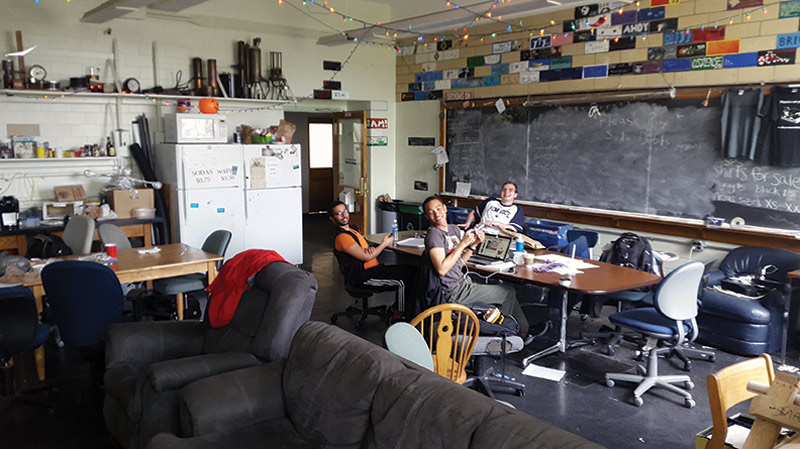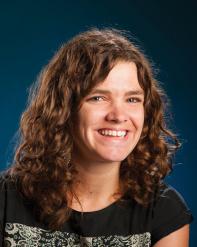Make Your Physics Lounge a “Safe Place”
Summer
2015
Special Feature
Make Your Physics Lounge a “Safe Place”
How to Become an Advocate for Inclusion
By:Therese Jones
Pennsylvania State University

The physics lounge: a location for physics students to gather, collaborate on homework, hang out between classes, or work on SPS projects. Those of us with such spaces often take them for granted; they help us meet other physics majors, discuss assignments, study for the GRE, and talk about future careers. In short, they provide a supportive network of peers so important for making it through the 3 am study sessions that often characterize our undergraduate careers.
 But what if not everyone has access to such a space? Through our language and actions, we can unintentionally erect barriers to access for those who need such networks the most. Crude remarks about women’s bodies, assertions that affirmative action prevents white men from getting into the graduate programs they deserve, jokes that describe Muslims as terrorists, and insensitive comments about the LGBTQ+ community are all means of closing off the physics lounge community. Students in the aforementioned groups often disappear from the lounge unnoticed or never make it in the door at all, because they were never part of the “in-group” to begin with.
But what if not everyone has access to such a space? Through our language and actions, we can unintentionally erect barriers to access for those who need such networks the most. Crude remarks about women’s bodies, assertions that affirmative action prevents white men from getting into the graduate programs they deserve, jokes that describe Muslims as terrorists, and insensitive comments about the LGBTQ+ community are all means of closing off the physics lounge community. Students in the aforementioned groups often disappear from the lounge unnoticed or never make it in the door at all, because they were never part of the “in-group” to begin with.
In defining the physics lounge, therefore, we often miss one crucial descriptor that should be part of every lounge’s vocabulary: the “safe space.” A safe space, as defined by the nonprofit organization Advocates for Youth, is “a place where anyone can relax and be fully self-expressed, without fear of being made to feel uncomfortable, unwelcome, or unsafe on account of biological sex, race/ethnicity, sexual orientation, gender identity or expression, cultural background, age, or physical or mental ability; a place where the rules guard each person’s self-respect and dignity and strongly encourage everyone to respect others.”1
Creating a safe space in the SPS lounge is a first step in making physics inclusive. But how does one establish a safe space?
Q: What can my chapter do to create a safe space?
A: Create a code of conduct. Establish what language and actions are not acceptable in your lounge and a means of accountability for those who use said language or perform said actions. See examples from the University of Sussex and Glasgow University.
Q: I don’t use offensive language. What is my role in creating a safe space?
A: You may not use such language, but being a silent part of the in-group when your peers use those words makes you complicit in the establishment of a volatile environment. Those who are marginalized by the in-group are often looked upon as overly sensitive if they speak up. Often, noticeable changes in behavior occur only once members of the in-group call out wrong behavior.
Q: What should I do if someone thinks I have used offensive language?
A: Learn how to apologize. Don’t get defensive, assert that your words were misconstrued, or blame the other person. Try to understand the other person’s perspective. Take responsibility for your words and the hurt they created. Express genuine remorse, make amends, thank the person for calling you out, and try to change your behavior.
Q: I notice a student of color/disabled student/woman/member of the LGBTQ+ community who does not hang out in the physics lounge. What should I do?
A: Invite students who are not part of study groups to join. If disruptive members make this difficult, form smaller study groups. Listen to the students you have invited if they offer to tell you about their experience, but do not force them to educate you about their underrepresented group.
Q: Not using racist language makes sense. But why can’t I have a healthy debate about affirmative action or other race-related topics?
A: Students of color have to live with the reality of their skin tone every day and cannot distance themselves from the subject of a race-related debate in the way that white students can. In a debate about affirmative action, students of color are forced to relive experiences where they have been perceived as incompetent based on appearance alone and question their presence in programs that others assert they were admitted to purely based on their color. This cycle perpetuates feelings of inadequacy that persist even in the face of successes, known as imposter syndrome, that students of color are particularly susceptible to facing, especially in fields where they may not have a single mentor who looks like them. Similarly, subjects such as police brutality are a reality that white students experience primarily via news and social media, but students of color could face any time they walk outside.
Q: I want to do more. What can I do?
A: Start a dialogue with your department. Consult your campus diversity initiative. Read about racism, sexism, ableism, and heterosexualism. For more advanced reading, see Dr. Chanda Prescod-Weinstein’s Decolonising Science reading list. Join the Equity & Inclusion in Physics and Astronomy Facebook group. Ensure everyone knows about conferences organized by the National Society of Black Physicists and the National Society of Hispanic Physicists, as well as the Conferences for Undergraduate Women in Physics. SPS provides funds for attending those meetings. Check whether your university does. //
Codes of Conduct
“Code of Conduct” @ University of Sussex LGBTQ Society: http://sussexlgbtq.weebly.com/code-of-conduct.html
“Our Values” @ Glasgow University Lesbian, Gay, Bisexual, Trans, Queer and Plus Association
Making Amends
Jessica Kirkpatrick’s “I was Wrong and I am Sorry” @ Women in Astronomy Blog: http://womeninastronomy.blogspot.com/2015/04/i-was-wrong-and-i-am-sorry....
Imposter Syndrome
Scicurious’ “Diversity in Science Carnival: IMPOSTER SYNDROME EDITION” @ Neurotic Psychology: http://scicurious.scientopia.org/2012/04/30/diversity-in-science-carniva...
Reading Lists
“Suggested Reading” @ Social Justice Training Institute:
http://www.sjti.org/suggested_reading.html
Chanda Prescod-Weinstein’s “Decolonising Science Reading List” @ Medium: https://medium.com/@chanda/decolonising-science-reading-list-339fb773d51f
Derrick Clifton’s “10 Simple Ways that White People Can Step Up to Everyday Racism” @ Everyday Feminism: http://everydayfeminism.com/2014/09/non-racist-white-person/
Franchesca Ramsey’s “5 Tips for Being an Ally” @ Huffington Post: http://www.huffingtonpost.com/2014/12/05/franchesca-ramsey-video-ally_n_...
Frances E. Kendall’s “How to Be an Ally If You Are a Person of Privilege” @ KNOWhomo, http://knowhomo.tumblr.com/post/10841967918
About the Author
Therese is an astrophysicist turned space-policy analyst, who is writing her PhD dissertation on the regulation of commercial human spaceflight at the Pardee RAND Graduate School. She also works on diversity and inclusion in the workplace issues for the US government and is a member of the Equity and Inclusion in Physics and Astronomy group.
